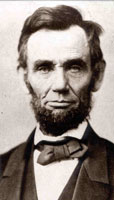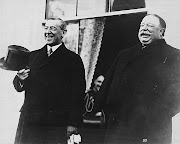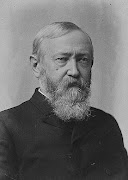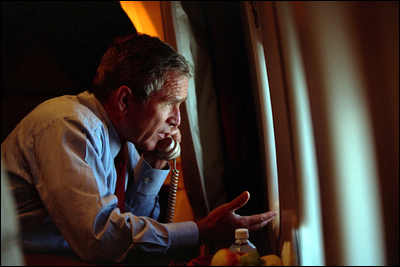Currently I’m a guest blogger at the fine site Hang Right Politics. Recently, I decided to do a year-long evaluation of the Presidents of the United States. The original posts will appear simultaneously at HRP, but I plan to use this site as a repository for my notes and the full postings to gather them all in one place.
Here, then, in this initial post, is the reasoning I gave back in early January explaining my reasoning for examining the presidents:
I’ve become intensely interested in the presidents since 9/11. I’ve become fascinated with presidential power and how it is wielded, as well as how presidents conduct themselves in office, how they weather the political and personal storms and how much they are hated for what they do—or don’t do. I’ve wondered what truly makes a good/successful president as opposed to a bad/failed president. What makes a mediocre president? Is a “bad” president necessarily a failed president? Is a “good” president necessarily a successful president?
Academics and historians frequently rate presidents. For example, The Wall Street Journal’s James Taranto (Best of the Web) teamed with the Federalist Society’s Leonard Leo a few years ago to write a book ranking the presidents on leadership. I don’t agree with all of their conclusions; for example, Grant should be ranked much higher, and recent scholarship agrees with me. Nevertheless, it’s a good read.
Arthur M. Schlesinger has put together a series titled The American Presidents, containing single-volume, full-length biographies of almost every man who has held the office (some volumes are yet to be written). This invaluable series of well-written bios (with a few exceptions) is succeeding in rescuing men such as Benjamin Harrison and Grover Cleveland from undeserved obscurity, and illuminating just how cursedly hard it is to be the president of the United States. (I’ve read the volumes on Grant and Cleveland. I’ve just finished reading Benjamin Harrison, am preparing to read George Washington and have Franklin Roosevelt on order.)
I already have opinions on almost every president, and am actually changing some as I conduct research. I’ve alluded to my opinions of one president before on this site, other than Bush, and that’s Grant, whom I believe is underrated and under-appreciated, and in fact belongs on Mount Rushmore for his entire service to this nation. What I want to do over the next year, if you’ll indulge me, is explore each president, starting with good ol’ George Washington, and talk about what made each man a successful or failed president, and a “good” or “bad” president.
A PROFESSOR’S ARROGANCE
The reason why I want to do this is because in mid-December, Eric Foner, DeWitt Clinton professor of history at Columbia University, declared in the Washington Post that George W. Bush is the “worst president ever.” Now, Foner has written some excellent history. His 1987 book on Reconstruction is superb and remains the standard on the topic. His first edition (but not the second) of Free Soil, Free Labor, Free Men: The Ideology of the Republican Party Before the Civil War is something every Republican office-holder and -seeker should read. But these were written before Foner’s full-fledged Marxism and blame-America, lefty moonbattery nonsense fully came to the fore.
Foner’s arrogant pronouncement—written as if there is absolutely no room for argument or discussion—really ticks me off. If Foner thinks full employment, a good economy, no follow-up attacks on American soil for five years, 50 million people liberated from two of the worst tyrannies ever, refusing to kowtow before Islamic fascism, etc., make Bush “the worst president ever,” end of discussion, I would hate to be a student in his class. Or he’d hate for me to be in his class, because I’d never let him get away with such garbage. The jury is still out on George W. Bush. Dubya had a terrific first term and has had, well, kind of an “ugh” second term — so far. But “worst ever?” Utter rubbish.
I’ve never actually done anything professionally with my history bachelor’s, so I’m excited about doing this. In this 42-part series examining each president, I intend to avoid the snotty pontification of Foner and concentrate on the men themselves. I will try to avoid using three things in my primary judgments, because they’re highly subjective:
Popular/unpopular. This is a double-edged sword. A president can be popular while in office by doing almost nothing (Clinton). A president can also be unpopular by doing what needs to be done—but can be lauded after he leaves office (or dies) for doing the right things at the right time (Lincoln, Truman). I’ll use these in the final rating, but not in measuring what kind of a president he was.
Good/greatest ever. These are such nebulous terms. A president can be a “good” president by being a leader (FDR, McKinley) or by being a milquetoast controlled by the party or Congress (Taylor, at least I’m thinking right now). He can also be called “one of the greatest ever” in part because of the unique set of circumstances they faced (Washington, Lincoln), but how do we really know if another man would have acted just as well in his stead?
Bad/worst ever. These are equally nebulous. A president can be a “bad” president by being an unpopular leader doing what needs to be done (Dubya), or he can be a bad president by doing things that are just plain stupid (Carter), or, again, nothing at all. He can be “bad” by making his entire party mad through upholding the Constitution (Tyler) or pursuing his own agenda (A. Johnson) or by refusing to treat the office of the presidency as a payola operation (B. Harrison). He can be a “bad” president by being a great man who was a disaster as a president (Madison) or didn’t do all that much with the office and therefore was a “bad” president in his own eyes.
So those terms are too nebulous and often contradictory to be as useful as you’d think. I’ll use those concepts in my final assessments, but not in primarily discerning what kind of president they were.
MY CRITERIA
So here are the criteria by which I will judge:
Success or failure. Did the president achieve the goals he set out to do at the beginning of, or during, his administration(s)? Did the successes/failures have long-term repercussions, positive or negative, for the country? What were his achievements? Why were they achievements? What were his failures? Why were they failures? Was re-election success/failure a reflection of acceptance/rejection of the man or his policies or both? Did the president and/or his party lose ground specifically because of his policies and legislation? (Benjamin Harrison is a great example.)
Leadership. Did the president take his role as chief executive seriously, and actually lead? Or was he merely a seat warmer? Did he govern by consensus or by actually leading?
Respect for the constitution. Did the president uphold the constitution and fulfill his duties? (This can sometimes be a difficult one to decipher, especially in latter days with partisans charging that a president “shredded” the constitution, their claims based more on politics and policy differences than actual violations of the constitution.)
Problem-solver. Did the president attempt to solve issues that were before him, or did he merely punt them down the field for the next man in line? Was a problem apparent at the time, or did it only manifest later, and its clues coalesce with the advantage of hindsight (in other words, can he be fairly judged by not tackling a problem that might not have been readily apparent during his time)?
Stumping. Was the president (and his team) an effective communicator of his vision and policies?
Private life. As the nation’s highest office holder, did the president conduct his private affairs with dignity and honor, and is there any “air” between his private life and public persona?
In other words, what did he do with his time in office? Did he move the Republic in a new direction? Did he set an important or critical precedent? Did he take the job seriously and serve faithfully, or did he treat it as his personal plaything? Was he beholden to party or did he rise above it? Is the man undeservedly forgotten, or is his reputation undeserved and overblown? Or has he richly earned his reputation, for better or for worse? Was the country better off for his having served, or worse—or indifferent?
I will give each one a final assessment based on the above:
(Highly, somewhat, mildly) successful, revered
Successful, popular
Successful, unpopular
Mixed, popular
Mixed, unpopular
Unsuccessful, popular
Unsuccessful, unpopular
Failed
SOME NOTES
First. I will not fall for the academic liberal trap of judging 18th and 19th century presidents by 20th and 21st century standards, e.g., he will not get a failing grade because he owned slaves. But I will point out when there is a modern application.
Second. I’m not too interested in ranking the presidents (though I might provide a list at the end) because it is often difficult to compare a president such as, say, Benjamin Harrison to someone like LBJ. The circumstances they faced were completely different, so how can they truly be compared? It’s almost like the Academy Awards: if all of the nominees for best actor had played the same role, then the contest would be worth something. But how can you truly compare the performance of people in different roles and different movies? So I’m more interested in how each president met the challenges of his own day. For example, Lincoln might have made a terrible peacetime president. Warren J. Harding could have become the greatest wartime president ever. The point is, each president faced a unique set of circumstances that no other president faced. That is what I am measuring against: themselves.
Third. Almost every president has done something worthy of praise—even Carter (ugh, did I just write that?) so each essay will include something to that effect. Some of these comments of praise won’t surprise, such as Washington giving up power. Some will surprise, like what I’ll praise Carter for. (You’ll just have to wait! But rest assured it isn’t anything that the dictators’ best friend would put on his resume today.)
Fourth. This endeavor will of course rely on the work of others. If I could do nothing else for a couple of years, then I would use a combination of original research, primary documents and published works. But I don’t have that luxury. My God, family and job all take priority. So, my primary sources will be the above-named American Presidents series, or, where warranted, other recent biographies. I am a fast reader, so I am not worried about that. (Although I will be reading the American Presidents entry on FDR and other source material, and not Conrad Black’s massive biography (as good as it is supposed to be) because I simply lack the time.)
Fifth. Have no fear that my political inclinations will color my evaluations. I will endeavor to be fair to all presidents, regardless of party or politics. Otherwise, this exercise would be useless partisan dribble. I want this to be a serious evaluation, not something that simply praises those whose politics I agree with.
I hope you will all find this enlightening and useful, as we count down toward the next presidential election year. So…look for my first essay on George Washington two Sundays from now (1/21), and then a new one every two weeks on Sunday (with some breaks in between). I should be finished with all of the presidents by early next year, God willing.
Subscribe to:
Post Comments (Atom)








No comments:
Post a Comment